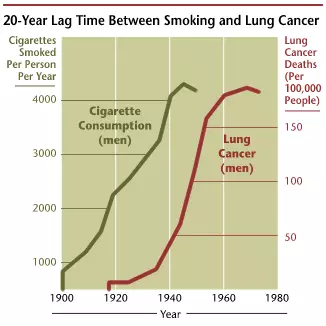Oct 21, 2009
Tuberculosis and subsequent risk of lung cancer in Xuanwei, China

Lung cancer has become more common in China in recent years. The rise in tobacco consumption is the most important factor in this increase. As is the case in many developing countries, indoor air pollution from poorly ventilated stoves is an additional risk factor, particularly for women.
However, it has often been suggested that tuberculosis (TB) might also increase the risk of lung cancer, because it causes lung inflammation and fibrosis that could induce genetic damage. This possibility has been backed up by a number of retrospective case–control studies of lung cancer that have reported a higher prevalence of tuberculosis among lung cancer cases compared with controls. However, until now, there has apparently been no cohort study, which would provide a higher level of evidence, to support the theory. 
Erica Engels and colleagues working in the rural county of Xuanwei, in China’s Yunnan Province used data from a retrospective cohort study of 42,422 farmers to examine the association between TB and lung cancer risk. The farmers were followed from 1976, and deaths from lung cancer were ascertained up to 1996. In 1992, the participants completed standardized questionnaires that included lifetime medical history as well as demographic and household characteristics and fuel and stove use.
Tuberculosis was reported by 246 (0.6%) of the participants. During follow-up, 2459 (5.8%) died from lung cancer (mortality 3.1 per 1000 person-years), including 31 of the 246 patients with TB (mortality 25 per 1000 person-years). The hazard ratio (HR) for lung cancer mortality was 6.1 for subjects with TB compared to those without TB.
The association between TB and lung cancer risk was especially pronounced in the first five years after TB diagnosis of, HRs ranging from 6.7 to 13. However, the association remained strong more than 10 years after tuberculosis diagnosis (HR 3.0).
Similar associations between TB and lung cancer were found both for men and for women. The researchers concluded that: “…our study supports the possibility that tuberculosis may act through a process of localized pulmonary inflammation and fibrosis to initiate or promote the development of lung cancer, particularly in conjunction with other carcinogenic exposures.”
If these findings are borne out by further research, then the global mortality for which TB is responsible is even greater than has been recognised. It also provides a further demonstration of the need to improve TB control programmes, particularly in developing countries. The authors furthermore suggest that periodic lung cancer screening of patients with a history of tuberculosis may be an effective strategy for early detection, which might ultimately improve cancer outcomes.
